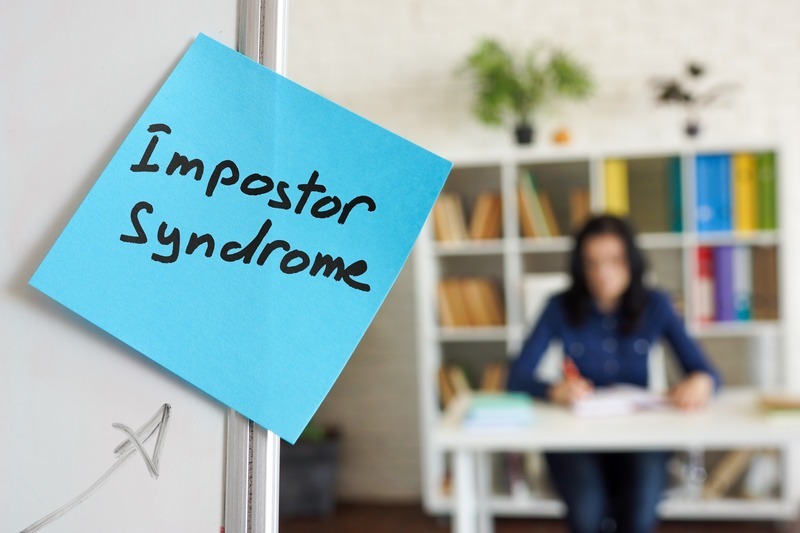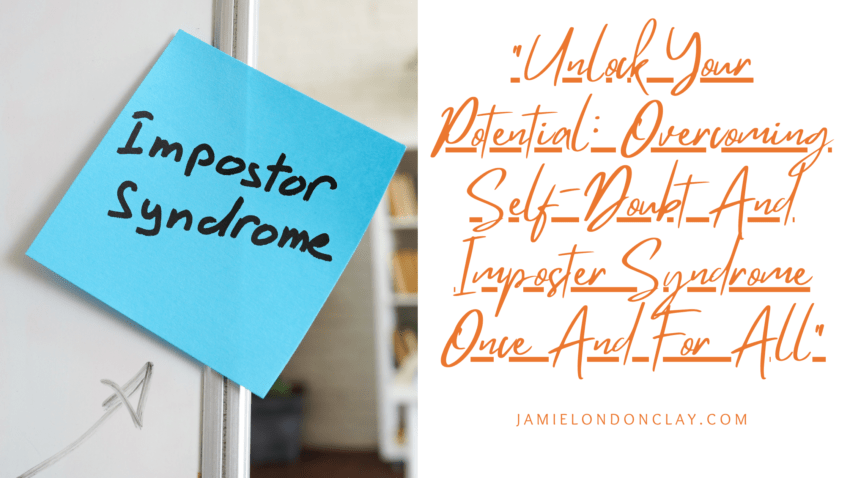
“Unlock Your Potential: Overcoming Self-Doubt And Imposter Syndrome Once And For All”
Discover powerful strategies to conquer self-doubt and imposter syndrome. Learn what imposter syndrome is, why it affects so many, and practical tips to build confidence and unleash your true capabilities.
Are you tired of feeling like a fraud? You’re not alone. According to the International Journal of Behavioral Science, approximately 70% of people experience imposter syndrome at some point. That nagging voice telling you you’re not good enough or don’t belong can be debilitating. But here’s the truth: you are capable, worthy, and deserving of success.
Imposter syndrome, coined in the 1970s by psychologists Pauline Clance and Suzanne Imes, refers to the persistent fear of being exposed as a fraud despite evidence of competence. It affects high achievers across all fields, from business leaders to creatives, and it’s time to break free from its grip.
This post will explore imposter syndrome, why it plagues so many, and, most importantly, how to overcome it. Together, we’ll explore practical strategies to silence the inner critic and step confidently into your greatness.
I’ve noticed that we all encounter uncertain moments at various times. This is especially true when self-doubt and imposter syndrome creep into our thoughts. Self-doubt is persistent uncertainty regarding one’s abilities or accomplishments, and imposter syndrome refers to feeling like a fraud despite evident success. This section will help shed light on these concepts and their significance in our growth.
It’s not uncommon for these feelings to surface in everyday scenarios, such as taking on a new job, showcasing a skill, or even interacting in social circles. I’ve felt that despite my best efforts, I wasn’t good enough or didn’t truly deserve my achievements. Perhaps you’ve felt this way, too.
Psychologically, self-doubt and imposter syndrome often stem from deep-rooted beliefs formed by past experiences, societal messages, or perhaps familial expectations. This isn’t just a fleeting moment of modesty; it’s an ongoing battle where our inner critic continually challenges our confidence. In moments like these, I’ve learned it’s not about silencing that critic but instead engaging with it constructively. How? We’ll discover that together in the tactical approaches laid out ahead.
Like many others, my journey has shifted from a place clouded by doubt to one where self-assurance has begun to take root. By sharing these strategies with you, I aim to give you the same tools that helped me start this transition. And, as we move into the next part of this discussion, remember that overcoming self-doubt and imposter syndrome isn’t about a singular victory. It’s about equipping ourselves to manage these feelings whenever they arise.
What Is Self-Doubt
Self-doubt is the lack of confidence in one’s abilities, decisions, or worth. It involves questioning oneself and feeling uncertain about one’s capabilities or judgments. Self-doubt can manifest in various aspects of life, such as career choices, relationships, and personal goals. It often stems from fear of failure, criticism, or comparison with others. Overcoming self-doubt involves building self-awareness, challenging negative thoughts, and cultivating self-compassion and resilience.
What Is The Imposter Syndrome
Imposter syndrome is a psychological pattern where individuals doubt their accomplishments and fear being exposed as fraud despite evidence of their competence and success. People experiencing imposter syndrome often attribute their achievements to luck or external factors rather than acknowledging their abilities and efforts. This phenomenon can lead to feelings of inadequacy, anxiety, and self-doubt, even in highly skilled and accomplished individuals.
Strategies for Overcoming Self-Doubt and Imposter Syndrome
Real change starts with actionable strategy. Overcoming self-doubt and imposter syndrome isn’t just about knowing they’re in your head; it’s about taking deliberate steps to confront them. Here, I share practical strategies that you can start using today.
Vulnerability might feel like a weakness, but it’s quite the opposite. When you’re open about your struggles, people can offer real help. It takes strength to say you don’t have all the answers. By acknowledging your vulnerabilities, you allow yourself to grow from the wisdom of others and the support they’re willing to provide.
Adopting a growth mindset is about viewing challenges as opportunities to develop your skills. Instead of thinking, ‘I’m not good at this,’ tell yourself, ‘I’m not good at this yet.’ It’s a slight shift in language that can lead to a significant change in attitude. With this approach, you transform obstacles into lessons.
A strong support network can be a lifeline. Reach out to mentors who can guide you and peers who understand your journey. Surrounding yourself with positive influences can uplift you and provide practical advice when self-doubt creeps in.
Start with simple exercises that counteract negative thinking. For instance, challenge a self-doubting thought with three positive reflections each time it enters your mind. This will start to train your brain to focus on your strengths and abilities rather than your perceived shortcomings.
Remember to appreciate the power of celebrating small wins. These victories prove you’re capable and competent, directly countering thoughts that suggest otherwise. Please make a point of acknowledging your progress, no matter how minor it may seem.
How to Overcome Self-Doubt:
1. Practice Self-Compassion:
Be kind to yourself and acknowledge that everyone experiences moments of doubt. Treat yourself with the same understanding and encouragement you would offer a friend.
2. Challenge Negative Thoughts:
Identify and challenge negative self-talk by questioning its accuracy and replacing it with positive, realistic affirmations.
3. Set Realistic Goals:
Break larger goals into smaller, achievable steps to build confidence and momentum. Celebrate each accomplishment along the way.
4. Cultivate Gratitude:
Focus on the things you’re grateful for in your life. Keeping a gratitude journal can shift your perspective and boost your self-esteem.
5. Seek Support:
Surround yourself with positive influences and seek guidance from mentors, friends, or support groups. Sharing your feelings can help you gain perspective and encouragement.
6. Embrace Failure as Growth:
See setbacks and failures as opportunities for learning and growth rather than reflections of your worth. Embrace the journey of improvement.
7. Practice Mindfulness:
Stay present and mindful of your thoughts and emotions without judgment. Mindfulness techniques, such as meditation and deep breathing, can help reduce self-doubt and anxiety.
8. Focus on Your Strengths:
Identify and celebrate your strengths, talents, and achievements. Remind yourself of past successes to boost confidence in challenging moments.
9. Take Action Despite Fear:
Don’t let fear of failure or rejection hold you back. Take small steps toward your goals, even if you feel uncertain. The action builds confidence.
10. Seek Professional Help if Needed:
If self-doubt significantly impacts your well-being or daily life, consider seeking support from a therapist or counselor. They can provide strategies tailored to your needs.
How to Overcome Imposter Syndrome:
1. Acknowledge Your Achievements:
Take time to recognize and celebrate your accomplishments, no matter how small they may seem. Keep a list of your successes to remind yourself of your capabilities.
2. Refute Unrealistic Standards:
Challenge the unrealistic expectations you hold for yourself. Understand that perfection is unattainable and that everyone makes mistakes.
3. Share Your Feelings:
Open up to trusted friends, family members, or mentors about your experiences with imposter syndrome. Talking about your feelings can provide support and reassurance.
4. Internalize Positive Feedback:
Accept compliments and positive feedback graciously instead of dismissing them. Internalize praise as evidence of your competence and value.
5. Focus on Learning and Growth:
Shift your mindset from a fixed view of abilities to a growth mindset. Embrace challenges as opportunities for learning and development.
6. Practice Self-Compassion:
Treat yourself with kindness and understanding, especially during moments of self-doubt. Offer yourself the same compassion you would give to a friend facing similar challenges.
7. Set Realistic Goals:
Break down your goals into manageable tasks and set achievable expectations. Celebrate progress and milestones along the way.
8. Seek Mentorship and Support:
Connect with mentors or peers who can provide guidance and encouragement. Surround yourself with a supportive network that believes in your abilities.
9. Challenge Negative Thoughts:
Identify and challenge negative thoughts and beliefs about yourself. Replace them with more positive and empowering affirmations.
10. Seek Professional Help if Needed:
If imposter syndrome significantly impacts your mental health or daily functioning, consider seeking support from a therapist or counselor. They can provide strategies to manage and overcome these feelings.
Sustaining Confidence and the Journey of Self-Love
Indeed, pushing past self-doubt and imposter syndrome is a monumental step toward personal fulfillment. However, real change comes from the continuous effort to nurture the seeds of confidence you’ve planted. Integrating self-care into your daily life isn’t just a one-time fix; it’s an ongoing process. To keep the momentum, consider rituals like morning affirmations or regular check-ins with your support network to reinforce your worth and progress.
Reflection is also a powerful tool in sustaining confidence. Practices such as journaling allow you to document your journey, recognize patterns, and celebrate growth. Mindfulness techniques can help anchor you in the present moment, reducing anxiety and giving you a clearer perspective on your abilities and achievements. These practices can become your foundational habits for maintaining a positive self-image.
I recommend ‘Unlocking the Power of Your Love: 5 Simple Ways to Practice Self-Love and Kindness Starting Now‘ for a deeper dive into building and sustaining self-esteem. It’s more than just a book; it’s a companion for your journey to self-love. This resource offers practical strategies and insights to enrich your path to personal acceptance and self-respect. I wrote it hoping to catalyze lasting change in how you view and treat yourself.
If you’re ready to take your next step toward a more loving and kind relationship with yourself, grab a copy of ‘Unlocking the Power of Your Love.’ Your future self will thank you for the investment in your well-being.
In Conclusion
Self-doubt and imposter syndrome may be expected, but they don’t have to define you. Armed with the right mindset and strategies, you can overcome these obstacles and thrive personally and professionally. Remember, you are capable of more than you realize.
Let’s keep the conversation going. Join our community of like-minded individuals committed to personal growth and development. If you’re looking for more strategies and support to help you thrive, subscribe to our blog, follow me on social media, share this article with anyone who may benefit, and leave a comment sharing your experiences and insights. Let’s empower each other to rise above self-doubt and imposter syndrome.
Together, we can ensure that self-doubt and imposter syndrome become a thing of the past.
Sources:
Neff, K. (2015). Self-Compassion: The Proven Power of Being Kind to Yourself.
Burns, D. D. (1999). Feeling Good: The New Mood Therapy.
Dweck, C. S. (2006). Mindset: The New Psychology of Success.
Kabat-Zinn, J. (1994). Wherever You Go, There You Are: Mindfulness Meditation in Everyday Life.
Clance, P. R., & Imes, S. A. (1978). “The imposter phenomenon in high achieving women: Dynamics and therapeutic intervention.” Psychotherapy: Theory, Research & Practice.
Neff, K. (2015). “Self-Compassion: The Proven Power of Being Kind to Yourself.”
Dweck, C. S. (2006). “Mindset: The New Psychology of Success.”

Hi one thing about life is that our beliefs have a very big impact on relationships and business. I think we grow up being taught that we’re not enough. That seems to be the default human belief. Maybe not for everybody of course but for many people. Getting around great people is a very effective way of combating this.
Hi Jake!
You’ve hit the nail on the head. Our beliefs play a significant role in shaping our relationships and business endeavors. It’s astonishing how deeply ingrained the belief of “not being enough” can be in many of us. However, surrounding us with positive influences and great people can bring about meaningful change. They can serve as mirrors reflecting our true potential and worth, helping us combat those limiting beliefs and empowering us to reach new heights. Building a supportive network of individuals who uplift, inspire, and challenge us is crucial for personal and professional growth. Thank you for sharing such insightful thoughts!